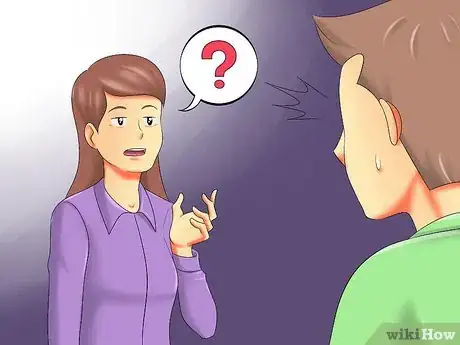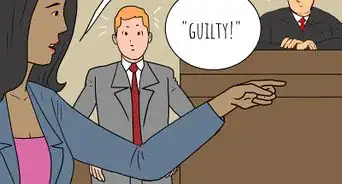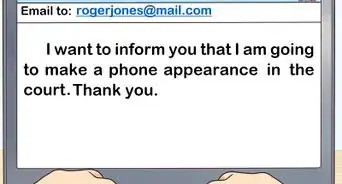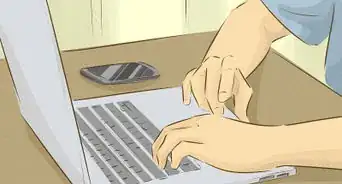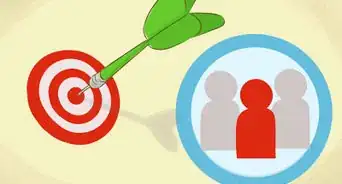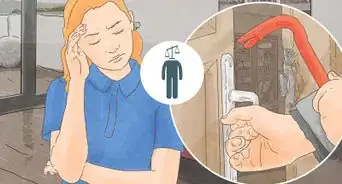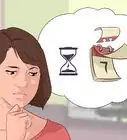This article was co-authored by Camila Lopez. Camila Lopez is an Attorney and is the CEO & Co-Founder of People Clerk. Her passion is breaking down complicated legal processes so that people without an attorney can get justice, and she co-founded People Clerk to help individuals navigate the court system in an easy and affordable way. As the Chief Legal Architect at People Clerk, she has designed the People Clerk platform so that individuals can learn how to pursue their small claims lawsuits on their own. As a trained mediator, she is also passionate about the out-of-court resolution of disputes. Prior to People Clerk, she worked in plaintiff’s mass torts litigation and in consumer protection at the New York Attorney General's Bureau of Consumer Frauds and Protection. She received a Bachelor of Arts in Political Economy from the University of California, Berkeley, and attended Benjamin N. Cardozo School of Law in New York City, where she received the Mark Whitlock Scholarship for her effort, energy, spirit, and initiative that strengthened student life.
There are 8 references cited in this article, which can be found at the bottom of the page.
wikiHow marks an article as reader-approved once it receives enough positive feedback. In this case, several readers have written to tell us that this article was helpful to them, earning it our reader-approved status.
This article has been viewed 189,096 times.
During a trial, your cross examination of the opposing counsel's witness is an opportunity to make him or her appear unreliable. Successful cross examinations capture the attention of the jury and judge and expose the holes in the other side’s case. A good cross examiner uses leading questions to elicit the desired response from the witness and advance the case in a positive direction.
Steps
Preparing to Cross Examine a Witness
-
1Have command of the case. To an outsider, a cross examination might seem like a series of random questions, but the process is actually incredibly well-planned and requires hours of preparatory work. It’s essential to know the ins and outs of the case in order to ask just the right questions. Start conducting research for the cross examination as far in advance of the trial as possible.
- Learn all the facts of the case, not just those you need to know before the trial begins. As you gather information to construct your case, determine how the cross examination will factor in. For example, if you're cross examining a doctor who is serving as an expert witness, figure out how it will help your defense if you show the person to be in some way unreliable. An entire defense can hinge on discrediting a witness.[1]
- Conduct extensive research on the witness you're going to cross examine. Knowing all about the person's background will help you figure out which questions to ask to get the answers you need to advance your defense. Make sure you can back up all of your facts with sources like signed statements, transcripts and official documents.
-
2Make a cross examination plan. This is the agenda you'll follow when it's time to cross examine the witness. Every single question you're going to ask, as well as the answers you anticipate receiving, should be planned out in advance. The goal is to ask a series of to-the-point questions that will steer the witness into giving answers that benefit you by revealing the holes, biases and weak points in the witness's testimony.
- Write out the questions in one column and the answers you want to receive in the other. Write out everything you want to say in detail and try to fully anticipate what the witness will say. Ask the witness questions about the specific evidence, whether it is for purposes of explanation, clarification, or to dispute something else that has been said during the course of the trial.
- Every answer should be backed up by research you conducted. For example, if you ask a witness how long he worked at a certain medical institution, you should have documented proof from the hospital that he or she worked there for a certain amount of time. That way, if the person gives an answer you didn't anticipate, you'll have evidence to the contrary—remember that it's your responsibility to review all the evidence to make sure you won't miss anything.
Advertisement -
3Do not plan to ask questions to which you don’t know the answer. It’s essential that you know the case so well that you can predict how the witness will answer your questions. Otherwise, the outcome might be a surprise and end up hurting your argument. Each question you ask should be calculated to drive the witness further toward admitting to a discrediting fact or weakness.[2]
- If you know the facts and have research to back them, you should know the answers. For example, you might ask the expert witness whether he or she was working on the night of June 19. You should already have documentation showing that he or she either was or was not working. If the witness gives a surprise answer that you know to be untrue, you’ll have the facts you can use to impeach the person.
- Surprise answers during a cross-examination are usually a thing that you should avoid at all costs.
-
4Ask your questions at the deposition. Have the entire cross examination plan ready to go by the date of the deposition, so you can see how the witness will respond. Consider it a test run to determine whether your plan is going to work. After the deposition, edit the plan to streamline it for the date of the actual cross examination.[3]
- If you don’t like an answer that was given, you can decide to omit that question at the trial. You should only ask questions with answers that are favorable to your case.
- If the person answers one way at the deposition and later answers differently, you’ll have grounds to impeach him or her.
-
5Find inconsistencies. When the witness is asked about the same subject more than once, inconsistencies are bound to arise, and it’s your job to find them and use them. At every opportunity, ask the same questions and record the answers. When you find something you can use, craft questions that will make the inconsistencies apparent to the jury and judge during the cross examination.[4]
- Find biases as well. Starting the cross examination with the witness’s bias can cast a shadow on the rest of his or her testimony.
- For example, you could begin by asking the witness how many times he has performed a certain type of surgery. If he said "8 or 9" during the deposition, and this time he says "15 or 20," refer back to the statement made during the deposition in your second question.
Crafting Effective Questions
-
1Include just one fact per question. If your questions contain too much information, you're more likely to get an answer you didn't expect. Keep your questions simple with just one important fact each. Take baby steps, having the witness confirm each fact with a “yes” before moving forward. In this way you can advance your argument slowly but surely, and you'll retain control over the situation.[5]
-
2Ask mostly leading questions, not open-ended questions. Almost every question should be constructed in such a way that the witness has to answer with one word: "yes." Lead the witness by stating a fact in the form of a question, then moving on to the next fact. This allows you to stay in control of the cross examination, eliminating opportunities for surprises to emerge. It will look as though the witness is agreeing with everything you say.[6]
- For example, instead of saying "What is your relationship to the defendant?" Say, "You met the defendant in January of 1999, when you were assigned to be roommates at the University of Virginia, correct?"
- Asking open-ended questions gives the witness too much leeway to give an unpredictable, subjective answer instead of a simple confirmation of the fact you already know to be true.
-
3Use non-leading questions strategically. In some cases, it's better to ask a question that's a little more open-ended than a simple "yes" question. A long series of leading questions can be tedious for the jury and judge to listen to, and sometimes you can make your point better by having the witness speak.
- When you’re cross-examining an expert witness, for example, it can be more effective to have the information come from that person’s mouth, especially if you plan to loop back and catch him in an inconsistency. For an expert, you have to be even more prepared than you are for other types of witnesses.
- Cross-examination is all about the preparation. How you prepare is the key question, because when you're in the moment, it’s too late to prepare.
- However, even open-ended questions should be carefully controlled. Be relatively sure of what answer the person will give, and follow up with more leading questions to keep the cross examination on track.
-
4Make sure the questions advance the trial plan. There’s no need to bring up inconsistencies unless they advance your case. Do not ask pointless questions, because with every extra question you ask, the chance of a surprise coming up increases. Every question should take you closer to the outcome you want.
-
5Avoid boring the judge and jury. Mix up the wording of your questions so you’re not just stating them the same way each time. New attorneys commonly construct each and every leading question the same way. "You ___, correct?" or "Isn't it correct that ___?" It's not necessary to constantly use the words "correct" or "true" to ask effective leading questions. You'll sound stronger and more convincing if you don't fall into this bad habit.
- Try simply stating the fact and using your tone of voice to indicate it's a question. For example, you could say "You met with Mr. Lee on the morning of August 2." The witness will answer "yes" even if you don't use the word "correct" to indicate it's a question.
Conducting the Cross Examination
-
1Stick to the plan. Do not stray from the cross examination outline if at all possible. The entire examination should be planned out so that you know exactly what to expect. You might be tempted to ask extra questions in reaction to something the witness says, but only do so if you're positive it's going to advance your case, and you're reasonably sure of what the answer will be.[7]
- If you get an answer you don't like, don’t argue with the witness. This will make you look bad, not the witness. If you have evidence that an inconsistency took place, you can impeach the witness.
-
2Tailor the questions to the individual. Don’t treat every witness exactly the same; home in on weak spots that will make the cross examination go your way. After practicing with a variety of witnesses, you'll start to understand how to adjust the tone and style of the cross examination to the visible responses of the jury, the judge and the witness.
- Ask easier questions in the beginning to make the witness feel comfortable, and lead up to the more complicated questions after trust has been established with the witness.[8]
- Be persistent and aggressive without being a bully.
-
3Finish strong. The witness's response to the final question will be the last thing a jury remembers. Once you’ve effectively run down your list of questions and made your point, it’s time to stop before you ask one question too many. If you crafted your outline well, you shouldn’t need to ask additional questions.
-
4Know when ‘’not’’ to cross examine a witness. If you don’t think the examination will advance the case, it can be counterproductive. Avoid cross examining just in case something useful crops up, since something detrimental could just as easily arise. If you don't have enough backup to ask strong leading questions, don't risk it. Focus your argument on a weaker point in the prosecution.
Expert Q&A
-
QuestionHow do you cross-examine a lying witness?
 Camila LopezCamila Lopez is an Attorney and is the CEO & Co-Founder of People Clerk. Her passion is breaking down complicated legal processes so that people without an attorney can get justice, and she co-founded People Clerk to help individuals navigate the court system in an easy and affordable way. As the Chief Legal Architect at People Clerk, she has designed the People Clerk platform so that individuals can learn how to pursue their small claims lawsuits on their own. As a trained mediator, she is also passionate about the out-of-court resolution of disputes. Prior to People Clerk, she worked in plaintiff’s mass torts litigation and in consumer protection at the New York Attorney General's Bureau of Consumer Frauds and Protection. She received a Bachelor of Arts in Political Economy from the University of California, Berkeley, and attended Benjamin N. Cardozo School of Law in New York City, where she received the Mark Whitlock Scholarship for her effort, energy, spirit, and initiative that strengthened student life.
Camila LopezCamila Lopez is an Attorney and is the CEO & Co-Founder of People Clerk. Her passion is breaking down complicated legal processes so that people without an attorney can get justice, and she co-founded People Clerk to help individuals navigate the court system in an easy and affordable way. As the Chief Legal Architect at People Clerk, she has designed the People Clerk platform so that individuals can learn how to pursue their small claims lawsuits on their own. As a trained mediator, she is also passionate about the out-of-court resolution of disputes. Prior to People Clerk, she worked in plaintiff’s mass torts litigation and in consumer protection at the New York Attorney General's Bureau of Consumer Frauds and Protection. She received a Bachelor of Arts in Political Economy from the University of California, Berkeley, and attended Benjamin N. Cardozo School of Law in New York City, where she received the Mark Whitlock Scholarship for her effort, energy, spirit, and initiative that strengthened student life.
Attorney Listen very carefully—that's the number one key! You have to listen very carefully so you can catch the witness in their own lie.
Listen very carefully—that's the number one key! You have to listen very carefully so you can catch the witness in their own lie. -
QuestionWould a prosecutor and a defense lawyer have the same witnesses?
 Community AnswerTraditionally, yes. The witness will be examined by whichever side they are on, and then they will get cross examined by the other side. For example, if you are a prosecution witness, the prosecution lawyer will question you and then once they are done, the defense lawyer will cross question you. If they have no questions for the witness, the lawyers can decline the right to cross examine.
Community AnswerTraditionally, yes. The witness will be examined by whichever side they are on, and then they will get cross examined by the other side. For example, if you are a prosecution witness, the prosecution lawyer will question you and then once they are done, the defense lawyer will cross question you. If they have no questions for the witness, the lawyers can decline the right to cross examine. -
QuestionHow do I cross examine a respondent who is guilty of cruelty and cheating in a divorce, but there is no evidence of this?
 Community AnswerYou must ask questions that will make the respondent admit to the cruelty and cheating. Remember that the respondent is innocent until proven guilty. You may ask leading questions, but don't badger the witness.
Community AnswerYou must ask questions that will make the respondent admit to the cruelty and cheating. Remember that the respondent is innocent until proven guilty. You may ask leading questions, but don't badger the witness.
Expert Interview

Thanks for reading our article! If you’d like to learn more about the life of an attorney, check out our in-depth interview with Camila Lopez.
References
- ↑ http://www.americanbar.org/groups/public_education/resources/law_related_education_network/how_courts_work/crossexam.html
- ↑ https://www.wisbar.org/NewsPublications/InsideTrack/Pages/Article.aspx?Volume=2&Issue=4&ArticleID=7710
- ↑ https://www.law.cornell.edu/rules/frcp/rule_30
- ↑ https://www.straight.com/news/873546/reasonable-doubt-credibility-court-and-your-behaviour
- ↑ https://www.americanbar.org/groups/litigation/committees/trial-evidence/practice/2018/tips-from-bench-cross-examination/
- ↑ https://familylaw.lss.bc.ca/bc-legal-system/if-you-have-go-court/trials-supreme-court/sample-questions-ask-when-cross-examining
- ↑ https://www.williamsmullen.com/sites/default/files/wm-url-files/PLIT0903_Baril.pdf
- ↑ https://www.americanbar.org/groups/gpsolo/publications/gp_solo/2014/september-october/a_guide_direct_examination_and_crossexamination/
About This Article
If you need to cross-examine a witness, study the case carefully to determine what you need from that witness. Plan out every single question you’re planning to ask, as well as the answers you anticipate receiving. Your questions should steer the witness into giving answers that benefit your side of the case. Conduct your own research into the questions you’re going to ask, and never ask a question if you don’t already know the answer. For tips on sticking to your plan during the cross-examination, keep reading!







